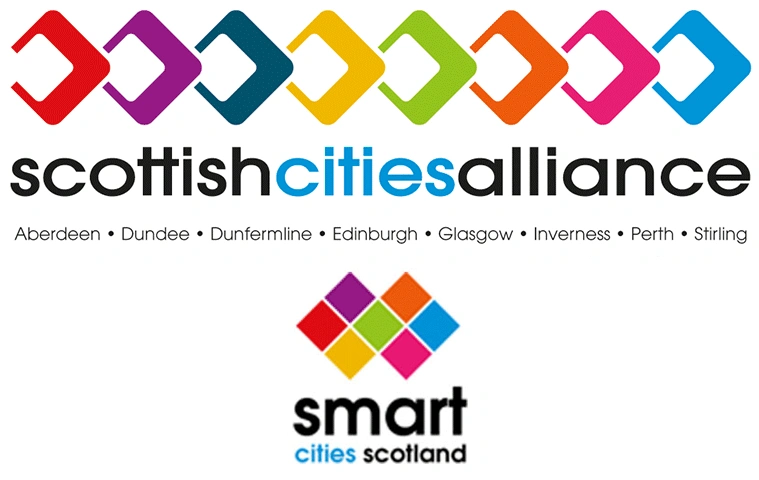From June 5th to 7th, 2024, Aberdeen hosted a significant gathering of local authorities and thought leaders from across the UK and Ireland. Organised by Connected Places Catapult, Scottish Cities Alliance, the British Embassy in Dublin, and Aberdeen City Council, the “Joining the Dots” event was a pivotal moment for discussions on the future of city centres. With a robust programme, it aimed to address the challenges and opportunities of revitalising city centres in a post-pandemic world.
Joining the Dots brings together local authorities and key thought leaders, to build connections around the shared challenges and opportunities and areas of economic strength for businesses in their respective regions by creating a safe space for confidential discussions. The project was initiated by the British Embassy in Cork and is facilitated by Connected Places Catapult and the British Embassy, Dublin.
Day 1: Soft Launch – Ports and Places
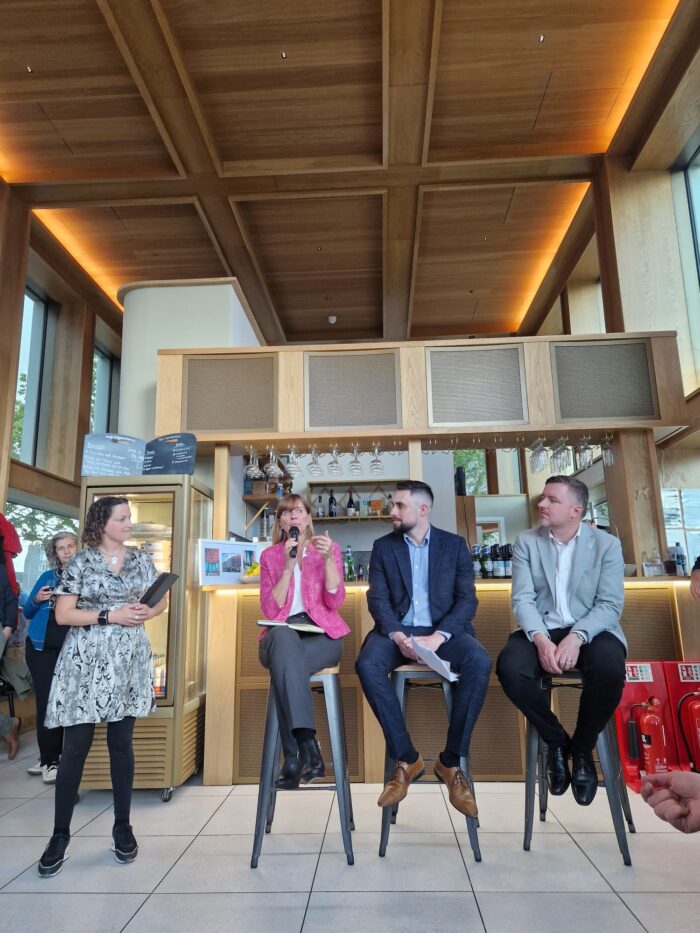
The event kicked off with an evening session at the Common Sense Coffee House and Bar. The welcoming remarks by Harry O’ Rahilly, Prosperity and Economy, British Embassy, Dublin and David Dunne, Chief Officer – Strategic Planning, Aberdeen City Council, set the tone for an engaging evening. An informal panel discussion chaired by Rachael Bampton-Aiken, Associate Director, Connected Places Catapult explored the crucial role of the maritime and ports sector in fostering sustainable growth. The panel featured Ross Curley, Head of Economic Development (Acting), Dublin, Marlene Mitchell, Commercial Manager, Port of Aberdeen, and Sean Maher, Place and Net Zero Policy Officer, Liverpool City Region Combined Authority, who delved into the potential of maritime industries to innovate and support community and economic growth.
Day 2: Visioning the Future of City Centres
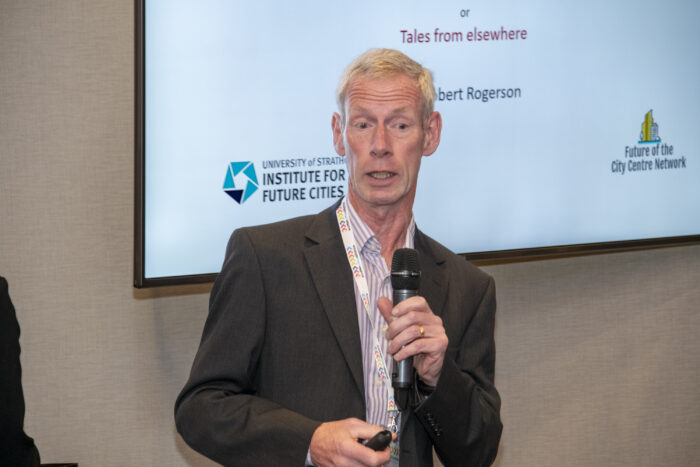
The second day was dedicated to in-depth discussions and presentations at The Sandman Hotel. The morning session started with Michelle St Clair, First Secretary, British Embassy, Dublin; Cllr Ian Yuill, Co-Leader, Aberdeen City Council, followed by a keynote speaker Dr. Robert Rogerson, Academic Director, Institute for Future Cities, who provided a global perspective on city centre recovery strategies. His insights highlighted the adaptability and resilience of city centres worldwide and underscored the importance of strengthening regional ties.
The session highlighted the shared vision of the panel, showcasing how regional policy levers were being effectively utilised to create a positive impact in collaboration with the community. The importance of partnership and collaboration was underscored as key elements in the success of the Aberdeen City Masterplan, and the formation of “Our Union Street”, headed up by Bob Keiller a former FTSE100 chief executive, sparking a community-driven movement to rejuvenate the area.
Aberdeen City Masterplan
Gale Beattie, Executive Director, Aberdeen City Council, outlined a visionary plan for revitalising Aberdeen city centre, focusing on regeneration, repopulation, and reinvigoration. In a comprehensive panel discussion, Julie Wood, Chief Officer of City Development at Aberdeen City Council; Professor Peter Exley, Dean, Robert Gordon University; and Bob Keiller, Chair of Our Union Street, explored the strategies to achieve these ambitious objectives.
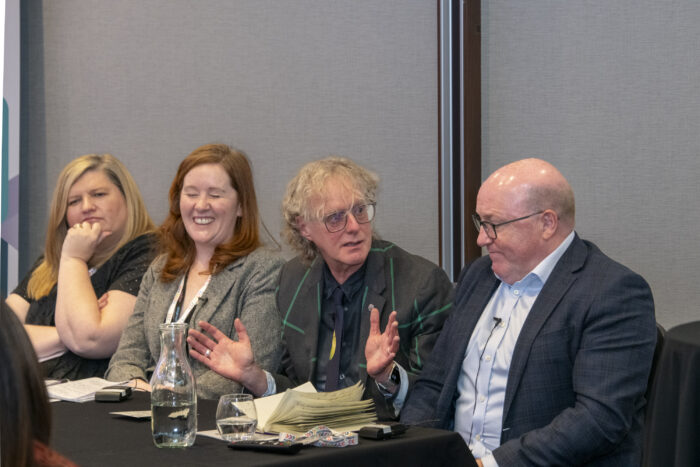
Public-Private Partnerships
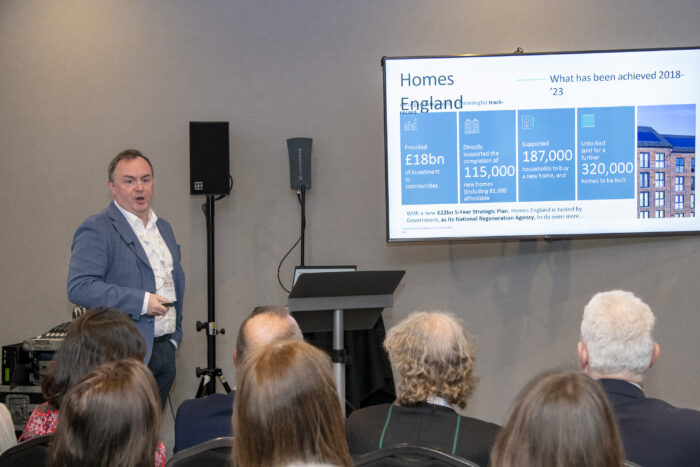
Iain Jenkinson, Executive Director, CBRE discussed the pivotal role of public-private partnerships in driving economic regeneration, and in particular delivering affordable housing, showcasing successful models like English Cities Fund, which is a partnership between Homes England, Muse and Legal & General. And highlighted CBRE’s role in offering consultancy and strategic advice, in the planning and execution of regeneration initiatives, drawing from examples in places like Salford.
Irish and UK Perspectives
Eoghan Lynch, Senior Planner, Galway City shared the innovative Greater Galway Charter, while Niamh O’Sullivan, Director of Services, Kerry County Council spoke about the Tralee Urban Renewal and Regeneration Project.
City Centre & High Streets Recovery and Renewal
Jason Thorne, Service Manager, Bristol City Council, presented Bristol’s approach to city centre recovery, highlighting creative uses of vacant properties, like Sparks Bristol.
Panel Discussion: City Centre Recovery – Challenge and Solution
A panel discussion featuring, Jamie Uprichard, Business Research and Development Manager, Belfast City Council; Jason Thorne, Service Manager, Bristol City Council, and Ross Curley, Head of Economic Development (Acting), Dublin City Council, addressed the challenges and solutions for city centre recovery, fostering an exchange of ideas and challenges.
Evening Reception
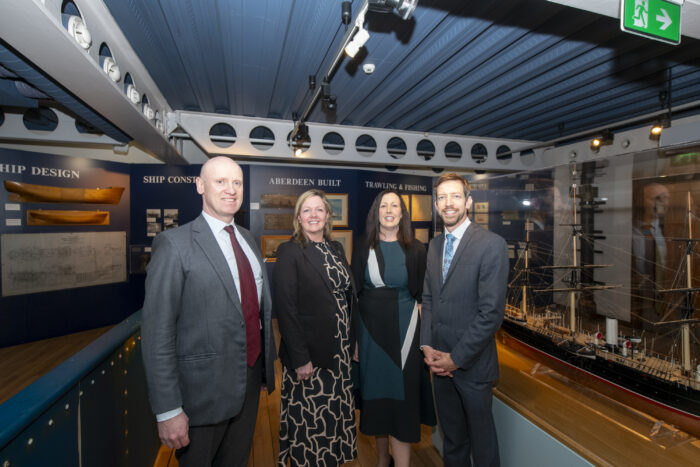
The day concluded with a civic reception and dinner at the Maritime Museum. Alex Cousins, Director for Local and Devolved Government at Connected Places Catapult; Councillor John Alexander, Leader of Dundee City Council and Chair of the Scottish Cities Alliance; and Michelle St Clair, First Secretary at the British Embassy in Dublin, opened the event. They emphasised the importance of collaboration and the sharing of knowledge, highlighting the value of local authorities coming together.
Before dinner, Alastair Wood, Director at Savills, and Rory Brooke, Head of Economics at Savills, shared their insights in a discussion facilitated by Katherine Fitzpatrick, Honorary Consul for Southwest Ireland. They discussed their work with Scottish cities on repurposing city centre housing and reducing vacant and derelict properties, sparking thoughtful conversations that resonated throughout the evening.
Day 3: Nuart Festival Guided Tour
The final day offered a unique cultural experience with a guided tour of the Nuart Aberdeen street art festival. This tour provided an opportunity to explore Aberdeen’s ongoing regeneration projects and the vibrant art that breathes life into the city’s streets.
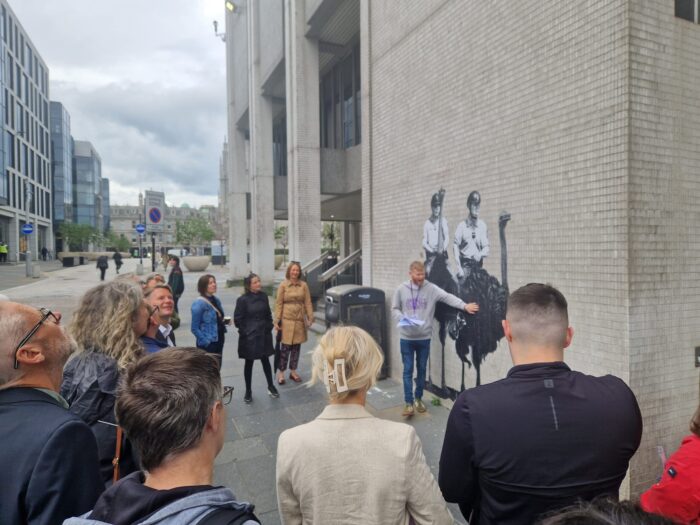
Key Takeaways
The “Joining the Dots” event underscored several critical themes:
- City Centre Resilience: The importance of adaptable and resilient urban centres that can withstand economic and social shocks.
- Public-Private Collaboration: The value of partnerships between the public sector, private enterprises, and community organisations in driving sustainable growth.
- Cultural Integration: Leveraging cultural initiatives like Nuart to enhance city attractiveness and community engagement.
- Innovative Regeneration Strategies: Implementing creative solutions to reduce vacant properties and increase residential capacity in city centres.
Overall, the event was a success, fostering a collaborative environment where participants could share knowledge, explore innovative ideas, and build stronger economic ties. As cities around the world continue to navigate the complexities of post-pandemic recovery, the insights and discussions from Aberdeen will undoubtedly play a crucial role in shaping vibrant, sustainable, and resilient places.
